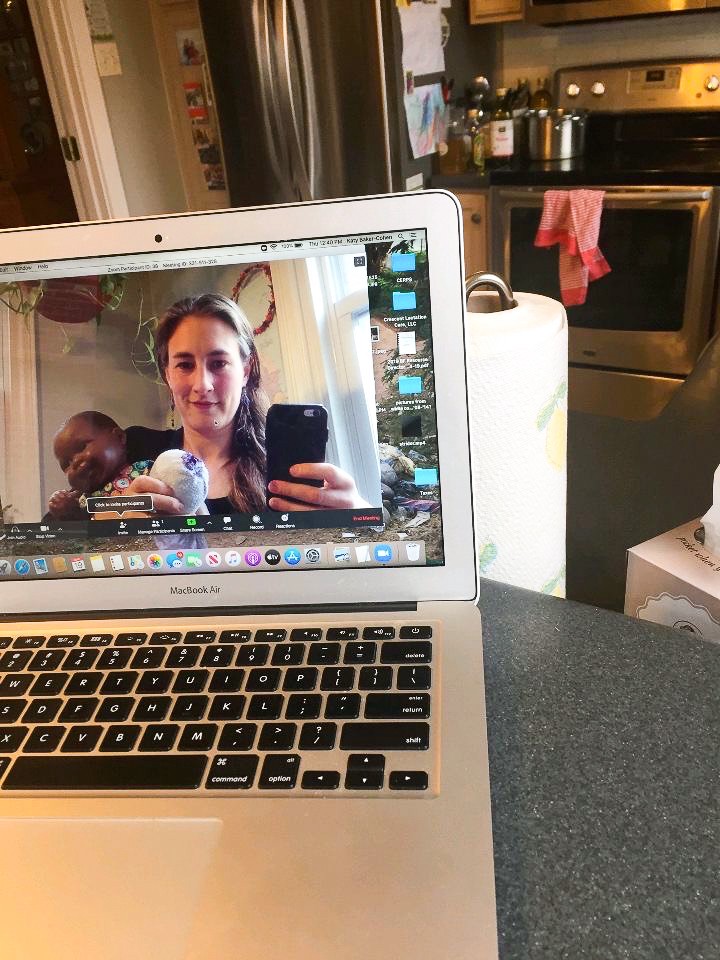
Kim Selman is the director of Germantown’s House at Pooh Corner Daycare Center. Selman closed her doors on March 13th, a few days before the city mandated all daycare centers remain closed during the COVID-19 crisis. Parents of children ranging in age from several months to five years old had to scramble to find solutions for the loss of daycare.
But Selman and her staff wanted to maintain connections for students and parents. “Our center has Instagram pages for each of the classrooms,” Selman said. “We’ve instructed the teachers to ask parents to send pictures of what the kids are doing at home and then post them on Instagram, just trying to keep the community connected.”
Childcare centers are using social media and web cameras in place of direct, hands-on service. Zoom, a popular video conference app, is now a useful asset not only for working at home, but for working with children.
“It was an idea I hatched thinking this experience is isolating for everybody,” Katy Chatel, at-home childcare professional, said. “I’m really wanting to keep the morale of the kids up. So I thought of being able to do circle time, like we often do at my house, but on the computer.”
When the COVID-19 outbreak began, Chatel immediately offered her at-home childcare services. She was surprised that many parents were adamant about keeping their children at home. She said she sympathized with children suddenly confined to home and missing daycare activities. “I think the hours and days feel a lot longer for kids.”
Chatel’s Zoom circle time includes songs, stories, games and daily assignments to complete after the session ends. Caroline Griswold Short and her two-year-old son Desmond participate in the virtual activity circles. Short, who found Chatel’s Facebook post about the idea, said she appreciates the alternative to face-to-face interaction. “Human connection, a sense of normalcy, are so important for kids and parents alike at times like this.”
Temple University professor Marsha Weinraub, a child psychologist, said daycare plays an essential role in helping children focus their attention, control emotions and interact with peers. The absence of daycare can disrupt a child’s daily routines and opportunities for developmental growth and learning.
“We know that children who’ve been involved in childcare and early education are more likely to be advanced in vocabulary skills and cognitive skills,” Weinraub said. “And kids are missing all of that”.
Weinraub said Zoom circle times are critical during the current crisis. “It’s important to know that the teachers, the people that they care about so much in the world, haven’t deserted them. It’s important to know that their friends exist somewhere, and their friends experience many of the same things.”
Chatel said her son’s first Zoom session improved his mood. He exchanged activities with other children and learned what they were doing during the quarantine.
Weinraub believes that activities on social media and Zoom are the best that people can do right now, but stresses that they are not enough and parents still need to provide additional enrichment. She is concerned for children who may not receive opportunities to further their growth and development at home.
“The kids I’m worried about are the kids who have parents who don’t have those resources,” Weinraub said, “parents who are not themselves well educated to be able to present the kinds of materials that are age-appropriate to children. Parents who don’t have books and stories and songs that they can share with their children so that children can continue learning”
With COVID-19 disruptions, screen time could be at an all-time high for kids. Weinraub hopes parents will find ways to include outdoor activities in their child’s schedule. Chatel includes getting outdoors in her assignments. “I [tell them] if your parents say it’s okay, and you guys are not sick, you need to go outside and tell me what you saw the next time we talk. I want to send them away with ideas of what to do off-screen.”



